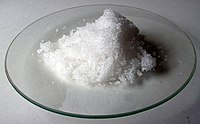
Photo from wikipedia
Biofuels are an alternative to fossil fuels and can be made from many different raw materials. The use of distinct catalyst and production processes, feedstocks, and types of alcohol results… Click to show full abstract
Biofuels are an alternative to fossil fuels and can be made from many different raw materials. The use of distinct catalyst and production processes, feedstocks, and types of alcohol results in biofuels with different physical and chemical properties. Even though these diverse options for biodiesel production are considered advantageous, they may pose a setback when quality specifications are considered, since different properties are subject to different reactions during usage, storage and handling. In this work, we present a systematic characterization of biodiesels to investigate how accelerated thermal degradation affects fuel properties. Two different types of biodiesel, commercially obtained from distinct feedstocks, were tested. The thermal degradation process was performed by maintaining the temperature of the sample at $$140 \,^{\circ }\hbox {C}$$140∘C under constant air flux for different times: 0 h, 3 h, 6 h, 9 h, 12 h, 24 h and 36 h. Properties such as density, viscosity, activation energy, volumetric thermal expansion coefficient, gross caloric value, acid value, infrared absorption, and temperature coefficient of the refractive index were used to study the thermal degradation of the biodiesel samples. The results show a significant difference in fuel properties before and after the thermal degradation process suggesting the formation of undesirable compounds. All the properties mentioned above were found to be useful to determine whether a biodiesel sample underwent thermal degradation. Moreover, viscosity and acid value were found to be the most sensitive characteristics to detect the thermal degradation process.
Journal Title: International Journal of Thermophysics
Year Published: 2018
Link to full text (if available)
Share on Social Media: Sign Up to like & get
recommendations!